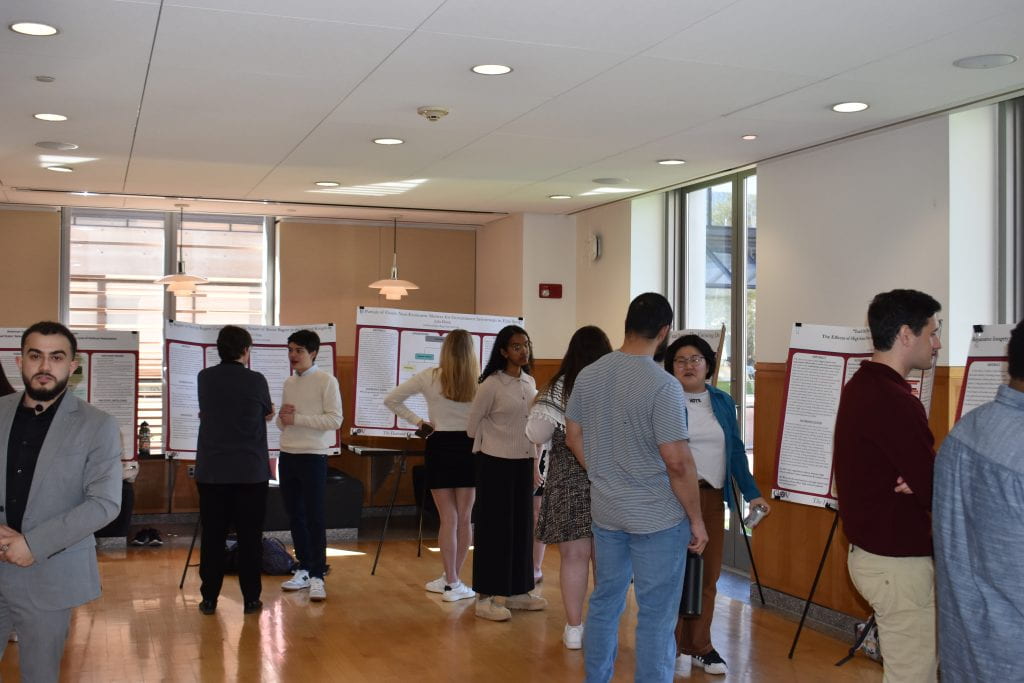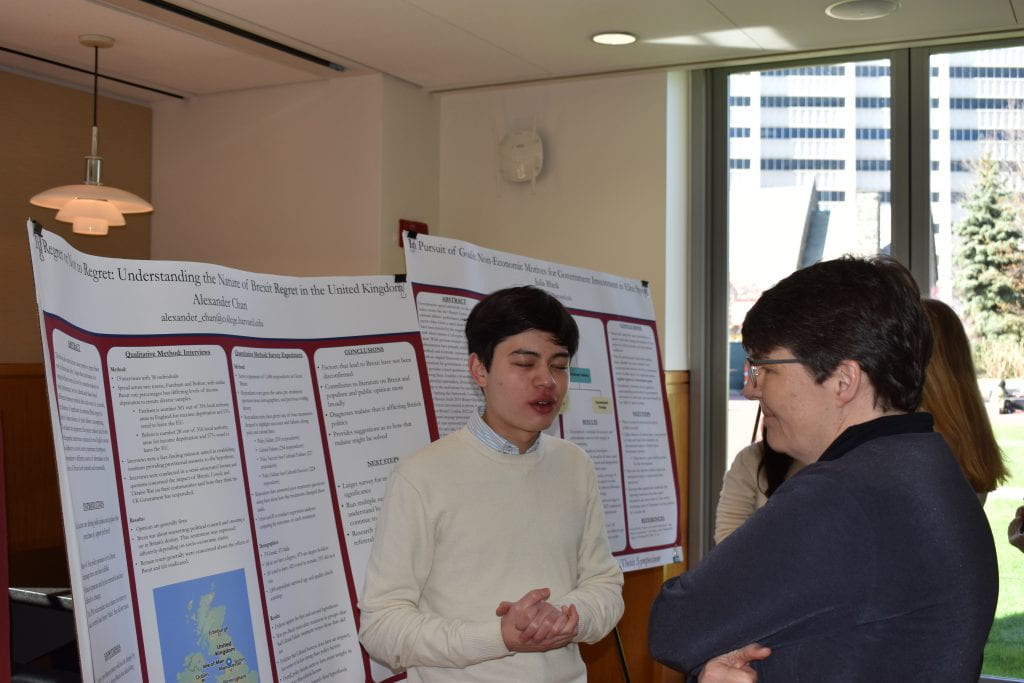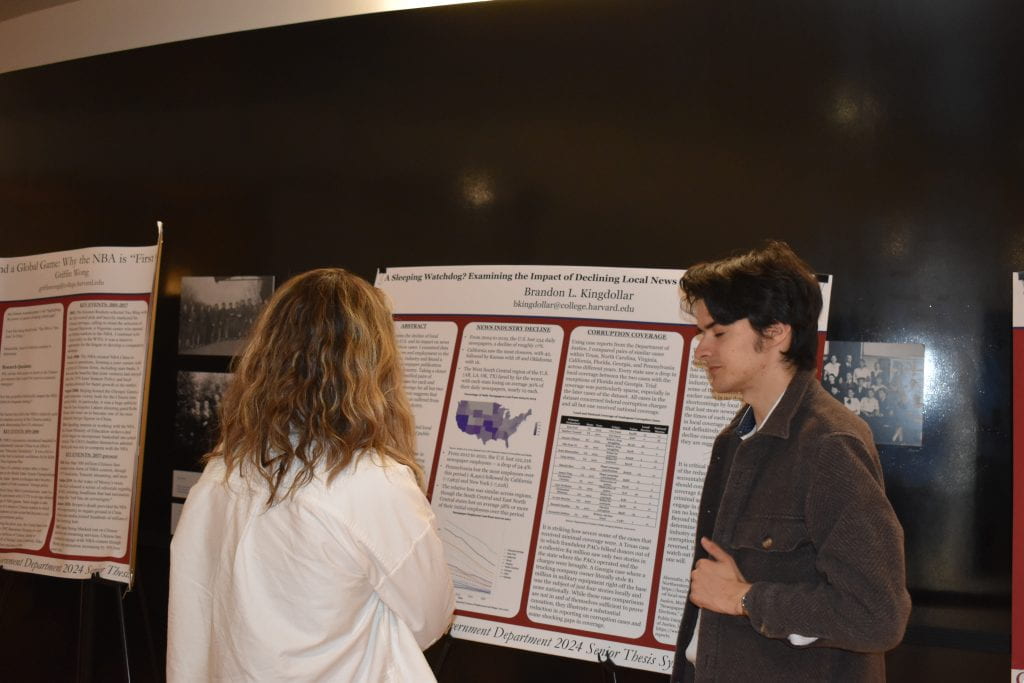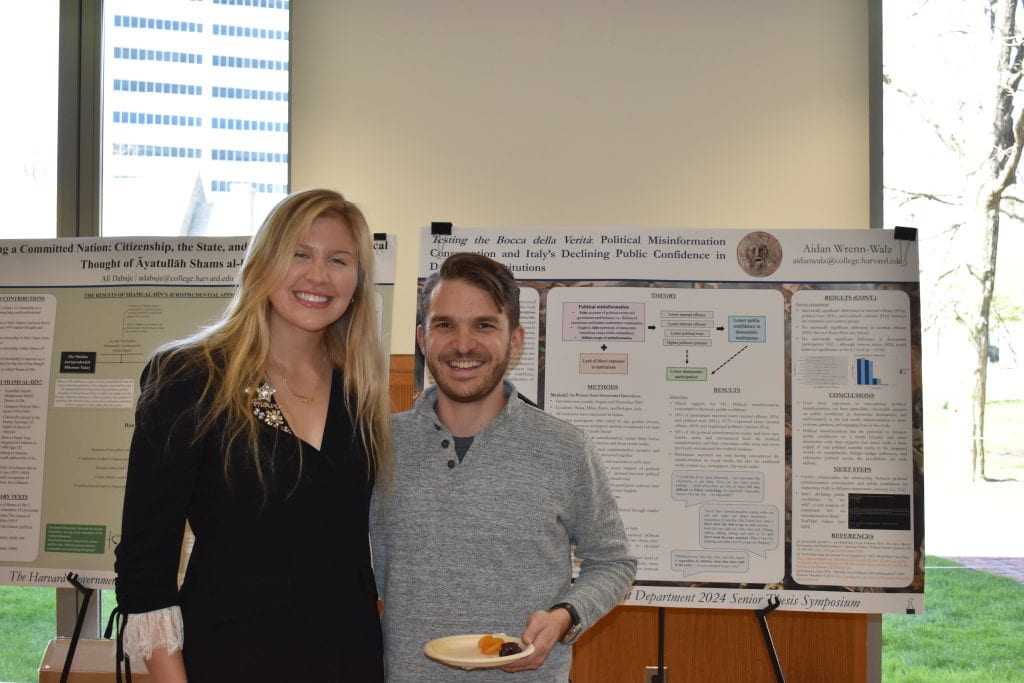Last week (04/24) we hosted the annual Undergraduate Thesis Symposium, where 39 of our senior concentrators presented their research to peers, faculty, and junior concentrators interested in writing a dissertation.
Held at CGIS Fisher Family Commons, the well-attended event saw a wide range of topics and presentations, from contemporary American politics – such as “Teach Me Why and How to Vote, Then I’ll Vote! The Effects of High School Voter Registration Drive on Youth Voter Participation” by June Park – to the intersection of political theory, race, and gender – such as Ebony Smith’s thesis “Consuming Chocolate and Blackness: Reparative Imagery to Address the Triple Oppression of Black Women in the Cocoa and Chocolate Industry”.

Three of our senior concentrators told us more about their thesis research.
James René Jolin: “A Tale of Two Pandemics: The Differential Effects of COVID-19 Infection and Death on Voter Opinions in the United States”
What is your thesis about?
My focus was on discovering the effect COVID-19 infection and death had on Americans’ attitudes towards their political leaders.
What conclusions did you draw?
Using two nationally representative surveys, I found that, on average, knowing someone who died from COVID-19 reduces Americans’ support for Trump and lower-level Republican candidates but increases support for Biden and Democrats. Conversely, individuals who contract COVID-19, recover, and do not know anyone who died show significantly higher support for Republicans and lower support for Democrats. These effects hold across Democrat- and Republican-identifying survey respondents but are most pronounced among Independents.
These effects are likely explained by how these distinct COVID-19 experiences alter individuals’ perception of the pandemic’s severity. Those who contract COVID-19 but do not know anyone who died show significantly less concern over the coronavirus and strongly oppose pandemic economic restrictions such as business closures, corresponding to increased support for Republicans. The reverse is true for those who experience a COVID-19 death.
These novel findings improve existing theories of crisis politics, which heretofore have neglected to explore how distinct crisis experiences reshape voters’ perceptions of a crisis itself. More broadly, my findings suggest personal crisis experiences can meaningfully alter Americans’ attitudes toward their political leaders, even in an era of acute partisan polarization.
Why did you choose this topic for your thesis?
My interest initially sparked in a Gov50 class in my Sophomore year – the crisis politics literature is replete with theories but has, by and large, neglected the heterogeneity of crisis outcomes. I therefore felt there were some interesting data gaps that I wanted to explore, specifically investigating the impact of diverse crisis experiences on voter attitudes and behavior.
What are your next steps following graduation?
I will be going on to do a Masters at Cambridge University in England.
Alexander E. Chan: “To Regret or Not To Regret: Understanding the Nature of Brexit Regret in the United Kingdom”

What is your thesis about?
My thesis asks what factors cause people to regret their vote for Brexit and why. I argue that motivations for voting for Brexit were led not by economic reasons or policy preferences, but by cultural and values-based differences between political elites and voters. As a result, the absence of significant documented Brexit regret in light of clear evidence of policy failure is unsurprising.
To evaluate the argument, my project employs data from ethnographic interviews conducted in two English towns in addition to a novel survey experiment that exposes respondents to different sources of information on the effects of Brexit both culturally and economically.
What conclusions did you draw?
The key takeaways were:
- Evidence against my first and second hypotheses (which were: 1. Voters’ pro-Brexit stances will not be changed by information that shows Brexit has failed along policy dimensions. 2. Voters’ pro-Brexit stances will be changed by information that shows that changes to political culture have not occurred.)
- More pro-Brexit views after treatment in groups that had ‘cultural failure’ treatment versus those that did not
- Evidence that ‘cultural success’ does have an impact, but seems to be less strong than policy factors
- Overall, policy factors seem to have more weight in this survey than cultural factors
What are the next steps?
To move this research on, the next steps would be to run a larger survey for more statistical significance as well as multiple surveys over time to understand how public opinion will continue to evolve. The piece would also benefit from research regarding populism and referendums in other countries.
Brandon L. Kingdollar: “A Sleeping Watchdog? Examining the Impact of Declining Local News on Coverage of Corruption”

What is your thesis about?
My thesis examines the decline of local journalism in the U.S. and its impact on news coverage of corruption cases. I examined data on newspaper closures and employment in the newspaper publishing industry and found a sharp contraction in newspaper publication and staffing across the country.
Taking a closer look at seven states, I identified pairs of comparable corruption cases for each and found a decline in local coverage for all but two of the case pairs. This evidence suggests that local coverage of corruption has suffered from the decline of the newspaper industry.
What conclusions did you draw?
The newspaper industry has shrunk considerably in the last two decades, and my findings suggest that coverage of corruption has declined as a result. This analysis must begin with the newspaper industry already amid its contraction —and some of the absences in coverage for even the earlier cases in my dataset show major shortcomings by local outlets.
Generally, states that lost more newspaper employees between the times of each case also saw sharper declines in local coverage and vice versa. My findings do not definitively show that local journalism’s decline caused this reduction in coverage, but they are suggestive of that dynamic.
What are your next steps following graduation?
I will be doing an internship at the Tampa Bay Times, looking specifically at investigative politics – so I look forward to bringing my studies and thesis research to this role.

Well done to all our senior thesis writers! Find out more about the undergraduate course at gov.harvard.edu/undergraduate
